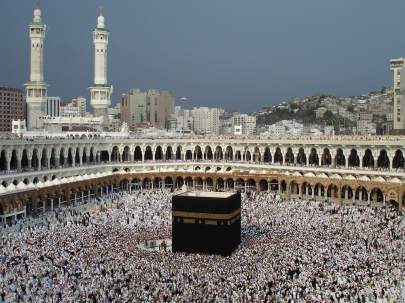Ramadan

March 14, 2024-Ramadan is the ninth month of the Islamic calendar. It is a month of fasting from sunrise to sunset, prayer, reflection, and community. It is also associated with jihad and martyrdom because of the greater spiritual rewards awarded during the month.
One of the five pillars of the Islamic faith, Ramadan is considered the most important month of the year. The five pillars which provide a framework for Muslim life are:
● Shahaadah (Profession of Faith) - to bear witness
● Salaat (Prayer) - five times a day
● Zakat (Almsgiving)
● Sawm (Fasting) - mandatory during Ramadan
● Hajj (Pilgrimage) - to Mecca if physically and financially able
The Islamic (Hijri) calendar consists of 12 lunar months in a year of 354 or 355 days. It is used to determine religious dates and observances. A new month begins when a new moon is sighted. Ramadan is called the “burning heat” month because fasting generates heat to rid one of desires.
The Islamic lunar calendar is approximately 11 days shorter than the average solar year in the Gregorian calendar implemented by Pope Gregory XIII in 1582. (Most of the modern world uses the Gregorian calendar.) This causes the Islamic calendar months to regress about eleven days earlier each year. The cycle of the Islamic months regresses through the seasons over a period of about 33 solar years. Ramadan in 2024 began on March 11; in 2023, Ramadan began on March 23.
“Ramadan is a month of jihad before it is a month of worship,” according to Houthi leaders in Yemen at rallies demonstrating against Israel and the United States. The Houthis are a Shiite terrorist organization that controls northern Yemen bordering the Red Sea. Since launching a civil war in 2014, it has been fighting the central Yemeni Sunni government with weapons and training received from fellow Shiite country Iran. Saudi Arabia actively backed the central Yemeni government until the Biden administration announced ending its support in 2021. Biden also removed the Houthis from the Trump terrorist list.
The Houthis have launched missiles and drone attacks against shipping in the Red Sea in support of Hamas in Gaza. One ship has been sunk. In response, Britain and the United States have launched airstrikes against Houthi missile sites. On February 29, Houthi leader Abdul Malik al-Houthi boasted that the airstrikes “have not affected our military power in any way.”
Jihad during Ramadan has been a feature of Islamic history:
1. Battle of Badr - Muhammad-led army defeats rival Arab army (623 C.E.)
2. Conquest of Mecca - Leads to submission of all major Arab cities (629 C.E.)
3. Battle of Tabuk - Expedition to Byzantium border in show of force (630 C.E.)
4. Battle of Hattin- Victory of Saladin over Christian Crusaders (1187 C.E.)
5. Battle of Amin Jalut - Egyptian Muslims defeat Mongol expansion (1260 C.E.)
Hamas has declared “Ramadan - The Month of Jihad, Fighting, and victory over the Enemies.”
Al-Jazeera, the Qatar-owned news outlet, posted an article on its website on how Palestinian resistance turned Ramadan into the season of attacks and victories. It lists the attacks and notes that Ramadan has always been the month of jihad and victory.
The “Night of Power” is the night during Ramadan that Muslims believe the Quran was first sent down to the world and received by Muhammad from the angel Gabriel. Since Muhammad could neither read nor write, he dictated the revelations to various scribes who wrote them down on whatever materials were available --- tree branches, stones, leather, and bones. After his death, the various writings were compiled in one place. A certification process began, and eventually, a uniform version of the Quran was produced.
Summary
Ramadan is practiced by Muslims worldwide. Fasting between sunrise and sunset can be difficult and present health problems for some, particularly in northern latitudes during summer months when daylight hours can last up to 24 hours. (A Muslim may follow the hours practiced in Mecca.)
Most Muslims pray, reflect on self-improvement, and provide community services during Ramadan. However, a significant number of Muslims believe and act upon Islam’s call for jihad, an Arabic word meaning “striving’ or “struggling.” In jihad, the struggle is for the propagation of Islam to dominate the world. According to Islamic tradition, the jihad struggle is most rewarded during Ramadan.
Action
Recognize that Islam has a religious and political imperative component to dominate the world. The accusation of “Islamophobia” should be ignored. There is no such thing as “Islamophobia.” It does not exist as a phobia is an unreasonable fear of something; there is nothing unreasonable about fearing Islamic jihad.
The United States should terminate all financial support to groups advocating “death to America and Israel.” This would include the United Nations Refugee and Work Agency for Palestinian refugees. It was founded in 1949 and has served as a breeding and training ground for anti-Semitic and anti-American propaganda. Why should we send billions to Gaza when the vast majority of its citizens support Hamas and hate America?
American leadership needs to educate American citizens on the need to have “Peace Through Strength:”
● Increase military and defense industry spending.
● Expand “gray zone” activities such as cyber warfare, public relations, and social media.
● Reciprocity should be the foundation of American policy. If a country is anti-American, then no aid will be provided. Bribery does not work.
● Establish a counterintelligence agency devoted exclusively to fighting domestic terror threats. It should be separate from the existing FBI, CIA, NASA, and Homeland Security, which have other duties.
Peace Through Strength!











